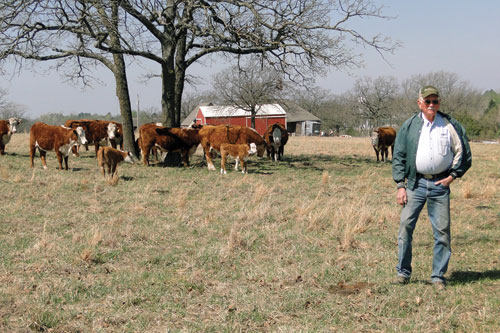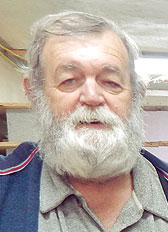 Tom and Sue Moore of Rudy, Ark., have a mission. They want to provide the healthiest and tastiest grassed-fed beef at the most affordable price possible while handling their stock humanely.
Tom and Sue Moore of Rudy, Ark., have a mission. They want to provide the healthiest and tastiest grassed-fed beef at the most affordable price possible while handling their stock humanely.
“This is a project in progress. We are constantly learning and improving and will always do so.” Tom said.
The Moores began their quest five years ago when they bought their foundation herd of registered Longhorns, some with double registration in both the Texas Longhorn Breeders Association and the International Texas Longhorn Association. They had purchased a 55-acre farm five years earlier. Then, when Tom sold his construction business, he researched the best breed for beginning their grass-fed herd and settled on Longhorns. His research showed Longhorns had few birthing issues, were good mothers and hardy, as well as highly self-sufficient. They thrive on native grasses and are good watchdogs, watching out for each other’s young. Finally, the breed tolerates line breeding very well, and uninvited people stay away because of their horns.
However, the Moores discovered a significant disadvantage with the breed. Longhorns are slow growing, with a steer taking two years to reach market. The Moores believe the time span makes high-quality, grass-fed meat more expensive, so Tom is switching to a registered Lim-Flex bull, hoping to add developmental speed as well as more structure and muscle while retaining the advantages of the Longhorn. Importantly Lim-Flex bulls have polled, black calves, due to double homozygous genes. This is important because less horn makes the cattle easier for the processor to accommodate.
“We sell our beef, plus lamb and free-range eggs, at our retail paint business, The Paint Store, in Van Buren, Ark.,” Sue said. “Because we want our customers to know that our meat and animal care standards meet the strictest guidelines, we applied and were the first farm in Arkansas to become certified animal welfare approved and certified grass-feed beef.”
The certification determines a multiple of procedures. Extensive computerized records provide additional proof that customers are getting exactly the kind of beef advertised. The records also are a significant contribution to herd management.
“Sue is the manager, and I am the ranch hand. She has the bigger hat,” Tom said.
Longhorns are both grazers and browsers, meaning weed control is unnecessary. However, Texas Longhorns sometimes need to be re-trained to recognize weeds like thistles as good food, even though their nutritional level is higher than grass. Training takes the form of introducing more weed content in increasing levels mixed in with a favorite like alfalfa until the cattle learn. Since calves learn from their mothers, the process does not need to be repeated again and again. Pastures received no fertilizer, other than cow manure broken up by periodically dragging a tire over the ground. Cattle hooves push both the manure and grass down to complete the fertilization process.
No intermediate feeds are used so the cattle get no GMO-enhanced nutrition or trace antibiotics, although they do have free access to salt and loose minerals. Because the Moores have only 55 acres, one-third of which is timber, the land alone cannot support their 28-head herd so the cattle are fed locally-grown alfalfa hay, which provides the protein boost needed to supplement their grass diet with the added advantage of the Moores knowing exactly how that hay is raised.
Vaccinations against disease are minimal and administered only after a veterinarian has been consulted. Finally, B&R Meat Processing in Winslow, Ark., also animal welfare certified, processes the beef.
“We go from milk to grass to cellophane and our customers reap the rewards,” Tom said.
Tom believes one of the best ways to help his cattle deal with cold weather is to feed alfalfa late in the day.
“That way their engines are working with digestion as the temperature drops, which helps keep them warm,” he said.
Although M&M Farm borders Frog Bayou, the spill off from the Fort Smith Lake dam, the cattle have no access to it. However, the geology of the lake and Frog Bayou provide a good water table. The farm has two wells, three runoff ponds and one spring-fed pond in addition to rural water. if needed.
“The only thing we don’t give our cattle is Perrier,” Tom said with a laugh.
The Moores live on 5 acres in Rudy, Ark., on which they raise free-range chickens. The couple buys chickens from FFA students after fair season, so their 18 laying hens stay young and productive. Consequently, their retail outlet is able to offer fresh free-range eggs.
“We are looking forward to the future. We would like to add pork to our retail offerings and are looking toward increasing retail outlets through a cooperative cattle raising venture with my brother,” Sue said. “For now, Tom and I enjoy what we do and watching the happy, eager faces of our four grandchildren.”







